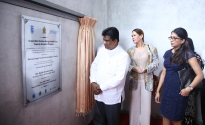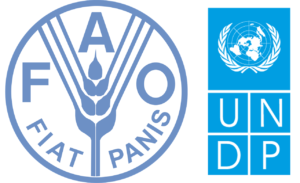Biomass Energy Terminal inaugurated in Homagama
www.fao.org, 17th November 2017
Promoting Sustainable Biomass Production and Modern Bio-Energy Technologies
The first formal biomass energy terminal of Sri Lanka was inaugurated in Homagama, Colombo on 08 November 2017 by the Hon. Ajith P. Perera, Deputy Minister of Power and Renewable Energy.

By 2017, this joint UNDP-FAO project has helped the Government of Sri Lanka to replace a significant percentage of fossil fuels used in the industrial sector with energy derived from biomass.
There has to be a continuous and sustained supply of quality biomass for it to be a viable energy source in industrial-scale thermal applications. Especially if it is to replace imported fossil fuels as a renewable alternative.

FAO was involved in supporting the establishment of fuelwood production systems which would provide the most suitable fuelwood in a sustainable manner. The different types of processed biomass fuels such as varying grades of wood chips have to meet an ideal mix to be able to produce biomass energy at a reasonable cost and with higher heat transfer rates – or conversion efficiencies. This makes biomass energy to be competitive among other commercialized fuels.
Recent technological developments related to modern biomass conversion technology and improved energy crop production has made it possible to produce biomass energy at lower cost and with higher conversion efficiencies.
The final component of the project will support end users in developing and having access to modern biomass energy technologies through local and international collaborations.
Background
The Sri Lanka Sustainable Energy Authority of the Ministry of Power and Renewable Energy is implementing the Global Environment Facility (GEF) funded Project on Promoting Sustainable Biomass Energy Production and Modern Bio-Energy Technologies with the support of the Food and Agriculture Organization of the United Nations (FAO) and the United Nations Development Programme (UNDP).
The goal of the project is to reduce greenhouse gas emissions from fossil fuel used for thermal energy generation in the Sri Lanka industrial sector by removing barriers to the realization of sustainable biomass plantation. It also aims to adopt and improve biomass-based energy technologies.
Addressing the gathering at the inauguration of the biomass terminal, Hon. Ajith P. Perera, Deputy Minister of Power and Renewable Energy stated, “I am confident that through the establishment of this biomass energy terminal, we can not only ensure that we have clean energy but also safeguard our forests.”
Speaking on the partnership between the stakeholders to contribute to the biomass energy sector, Ms. Lovita Ramguttee, Deputy Country Director, UNDP Sri Lanka stated, “Over the past 50 years, we have been a key development partner for the Government of Sri Lanka and we remain committed to helping the country achieve sustainable human development. We are working both through UNDP-led initiatives and through inter-agency collaboration within the wider UN system through projects such as this to help achieve the vision for a greener and sustainable Sri Lanka.”
Also addressing the gathering, Ms. Nina Brandstrup, Sri Lanka Representative, FAO, Sri Lanka stated, “Wood energy can make a worthy contribution to economic growth, and create ‘green’ job opportunities, clean enterprises and improve living standards in rural areas. FAO is pleased to be a part of this project to contribute towards a greener Sri Lanka.”
The establishment of the terminal in Homagama is part of this endeavor. With the capacity to generate 40 MT of processed and high-quality biomass fuel per day, this terminal will operate as a collection and distribution center of biomass energy, even out demand and supply fluctuations, and play an important role in the long-term sustainability of the biomass energy sector.
